
On Wednesday, March 31, ASUCR held their first meeting of spring quarter where they discussed updates to the upcoming ASUCR Elections and passed a resolution advocating for a safe, in-person graduation ceremony.
Elections Director Lama Yassine updated the senate on the timeline for the upcoming ASUCR elections. Next week, the elections committee will begin hosting Candidates Conventions for both senators and those running for the executive branch, giving each candidate the opportunity to discuss their platforms. Voting Week is scheduled to begin on Monday, April 19.
Yassine also announced the candidates who will be running in the 2021 ASUCR Elections. They are:
Executive Cabinet
President – William Wang
Executive Vice President – Mufida Assaf, Sean Nguyen
Vice President of Finance – Steven Luu, Jeffrey Tran
Vice President of Campus Internal Affairs – Arshneel Kaur, Nelson Aguiar
Vice President of Campus External Affairs – Aaron Sanchez, Elysha Castillo
Vice President of Sustainability – Alondra Martinez, Barry Liu
Extended Cabinet
Personnel Director – Connley Neufeld, Lena Nguy
Marketing and Promotions Director – Mehak Sharma, Wallace Fang
Transfer/Non-traditional Student Director – Roxanna Vasquez, Sonali Murugan
CHASS Senator – Aalani Richardson, Alejandro Martinez, Angelo Velasquez, Angelina Chavez, Blanca Estela Alba, Christian Martinez, Christopher Kent, Christopher Kim, Cristian Torres, Gabriel Davis, Helen Chu, Hoang Vu, Ismail Kiswani, Joshua Moran, Lauren Grace Garcia, Orlando Cabalo, Sam McLean, Shay He, Victoria Nguyen
CNAS Senator – Catelin La, Myra Usmani, Rachel Paredes, Ridwan Syed, Tammar Akel
BCOE Senator – Amy Do, David Kiroloss, Henry Zheng
SPP Senator – Arleth Flores Aparicio, Joshua P. Deese, Sam Habibi
GSOE Senator – No candidates. ASUCR will host a special election to fill this seat in May 2021.
Full candidate biographies can be found on the ASUCR Elections website.
In a unanimous decision, the ASUCR Judicial Council’s deliberations came to a conclusion regarding Senator and President Pro Tempore Orlando Cabalo, Executive Vice President Natalie Hernandez and Personnel Director Sean Nguyen’s constitutional challenge to a statute on March 4. The issue was regarding SB-W21-007 which states, “ASUCR Senators, Directors or Executive Cabinet members who have filed to run in ASUCR Elections or are planning to run, must recuse themselves from voting on any bylaw changes, resolutions, or new bylaw additions, or all affairs regarding elections after candidacy has been filed. Failure to do so may count towards election strikes, the assigning of which shall be determined by the Judicial Council.”
In their official written decision, the ASUCR judicial council wrote, “Previous interpretations of this bylaw understood it to be that any ASUCR Senators, Directors, or Executive Cabinet members who have filed to run or are planning to run were still able to vote in any bylaw changes, resolutions, or additions, specifically excluding just Elections Code affairs. However, after March 3rd, a new interpretation was called to attention.” The new interpretation led to an underrepresentation of senator votes during the majority of the winter quarter.
To amend the issue, the Judicial Council decided to revert the bill back to its original interpretation with some changes. Now, ASUCR senators, directors or executive cabinet members who have filed to run in the ASUCR Elections or are planning to run, must recuse themselves from voting on any bylaw changes, resolutions or new bylaw additions that have a conflict of interest, and/or any other legislative action which may impact upcoming elections after candidacy has been filed.
During LRC, the senate voted on a bill amending the senate internship program, SB-S21-002. The amendments include putting the internship program under the office of the EVP and the president pro tempore, as well as refining the responsibilities and duties of senate interns. The motion passed with a vote of 10-0-3.
CHASS Senator Lizbeth Marquez Torres authored SR-S21-002 along with Hernandez to advocate for a safe, in-person graduation ceremony. The senate resolution states that the UCR Commencement Task Force has not listened to students’ concerns and requests surrounding the 2021 graduation and has refused to work with students on the task force to create a graduating experience that is both safe and beneficial to all. The resolution states that with vaccines becoming widely available and UCR planning to offer 75% to 80% of all courses in-person for the fall 2021 term, an in-person graduation ceremony should be considered.
Other universities in Southern California have announced their plans to host in-person commencement ceremonies in some capacity such as the USC and California State University, Fullerton. SR-S21-002 Advocating for a Safe, In-Person Graduation Ceremony was passed unanimously with a vote of 13-0-0.
The meeting was adjourned at 7:43 p.m.







